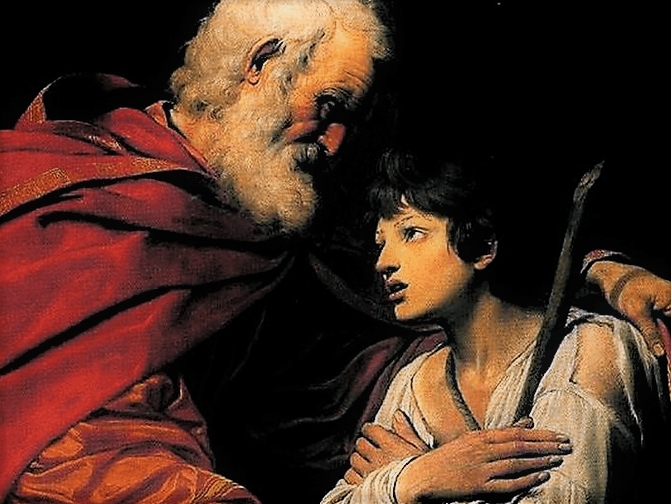POPE FRANCIS:
HAVE THE COURAGE
TO CALL GOD, “FATHER”!
“To invoke Him as “Father” puts us in a relationship of confidence with Him, as a child who turns to his father, knowing that he is loved and cared for by him. This is the great revolution that Christianity imprints in man’s religious psychology. The mystery of God, which always fascinates us and makes us feel small, does not, however, make us more afraid, it does not crush us; it does not make us anxious. This is a difficult revolution to receive in our human mind, so true is this that even in the accounts of the Resurrection it is said that the women, after seeing the empty tomb and the Angel, “they went out and fled [. . .] for trembling and astonishment had come upon them” (Mark 16:8).

However, Jesus reveals to us that God is a good Father, and he says to us: “Do not be afraid!”
Let us think about the parable of the merciful father (cf. Lk 15:11-32). Jesus tells us about a father who can be only love for his sons. A father who does not punish his son for his arrogance and who is even capable of entrusting him with his half of the inheritance and allowing him to leave home. God is Father, Jesus says, but not in the human way because there is no father in this world who would behave as the protagonist of this parable. God is Father in his own way: kind, defenceless before man’s freedom of choice, able only to conjugate the verb ‘to love’. When the rebellious son, after squandering everything, finally returns to the home of his birth, the father does not impose criteria of human justice, but rather he first feels the need to forgive, and with his embrace he conveys to his son that in all that long period of absence, he had missed him, his fatherly love had painfully missed him.
What an unfathomable mystery is a God who nurtures this type of love towards his children!
It is perhaps for this reason that, in evoking the core of the Christian mystery, the Apostle Paul does not feel up to translating into Greek an Aramaic word which Jesus pronounced as “Abba”. Twice in his Epistles Saint Paul uses this term, and he does not translate it either time, leaving it as it came from Jesus’ lips: “Abba”, a term which is even more intimate than “father”, and which some translate as “Dad, Papa”.
Dear brothers and sisters, we are never alone. We can be far away, hostile; we can even profess that we are “without God”. The Gospel of Jesus Christ however, reveals to us that God cannot be without us: He will never be a God “without man”. It is he who cannot be without us, and this is the great mystery! God cannot be God without man: this is a great mystery! And this certainty is the source of our hope, which we find safeguarded in our every invocation of the Our Father. When we need help, Jesus does not tell us to resign ourselves and close ourselves off, but rather to turn to the Father and ask him with confidence. All our needs, from the most evident, daily ones such as food, health, work, to those of forgiveness and support against temptations, are not the reflection of our solitude. There is, instead, a Father who always looks at us with love and who certainly does not abandon us.
And now I have a proposal for you: each one of us has many problems and many needs. Let us reflect a bit, in silence, about these problems and these needs. Let us also think about the Father, our Father who cannot be without us, and who, at this moment, is looking at us. And all together let us pray with confidence and with hope: “Our Father, who art in Heaven…”.
Excerpt from Pope Francis, General Audience, June 7, 2017

